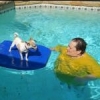Search the Community
Showing results for 'alcohol'.
Found 17,501 results
-


Vulnerability, Weight Loss Surgery and Cross-Addictions
Sara Kelly Keenan LC posted a topic in Weight Loss Surgery Magazine
Extremely overweight people who become thin very rapidly through surgery can sometimes feel very vulnerable and unprepared to deal with not only their own changing bodies but also the reactions of friends and family to the "new" body. Sometimes they are uncomfortable being the object of sexual desire for the first time in their adult lives. Especially with women, I have also seen that some feel as though they are ostracized by other women because those other women believe that their formerly fat friend has become an attractive threat to their own relationship. Others may feel self-conscious or unattractive because an extreme weight loss leaves them with skin folds or scars. They sometimes feel that surgery did them no good because their bodies still stand-out in public and in private as unusual. One client referred to it as the "Is That All There Is?" syndrome. She said she somehow believed that losing 150 pounds would leave her with a body that society would consider beautiful and what she got was abdominal flesh hanging over her thighs. I notice this is especially true when a person going into the surgical process is focused on getting thin or attractive rather than on getting healthy. There can also be problems in intimate relationships. One woman spoke of her husband's lack of interest in her sexually. In all other ways the relationship was healthy so they were able to talk about it. What she learned was that after the weight loss her husband felt unworthy of her because he was still overweight. He also lost his sexual confidence when his overweight wife, in his words, became "one of the girls in high school who wouldn't give me the time of day." Also, if a WLS patient has early-life traumas unaddressed or not completely addressed prior to surgery the loss of food as a way to placate stress and to reduce anxiety can be a new source of trauma. This leaves many facing a very difficult transition to a life not centered around food. All of these stressors and others are a breeding ground for cross-addictions. It is vital to consider before surgery and in the "thinning" months and years after surgery how you will deal with stress, sadness, fear, loneliness, anxiety, or whatever thoughts and feelings triggered emotional eating in the past. If there is no healthy outlet for these the body and mind will create whatever outlets they can, which most commonly include alcohol, drugs, sex or gambling. The problem of replacing food addiction with alcohol addiction is the one I have personal experience with and have seen the most in people I've encountered. In 2006, three years after LapBand surgery, I developed an addiction to alcohol. I had lost food as my companion, soother of stress, provider of sensual satisfaction and entertainment. I was not able to eat the comfort foods that placated my fears of life prior to WLS and I desperately craved an outlet for uncomfortable emotions and beliefs I took-on and began running from during my childhood in a violent home. So three years after WLS, and after loosing 110 pounds, my dinner every night became a 6-pack of Vodka coolers or more (Sour Apple or Grape) and ironically Healthy Choice low-fat ice cream. At my lowest I was 220 pounds and I felt very uncomfortable and vulnerable in a smaller body. I continued to wear large, baggy clothes because I was afraid to look feminine. Feminine to me then meant I was vulnerable and open to attack. This went on for a year, during which I regained all 110 pounds lost and felt like a failure. Worse, I felt like a public failure because everyone around me knew I'd had LapBand surgery. What I had to do was address the beliefs and fears I had about what it meant to be feminine. I had to come to terms with my past and embrace a future in which it is possible and within reach to be healthy, feminine and safe. To avoid cross-addictions, it is important that individuals considering surgery or those who have had surgery take this very personal, individual journey into the beliefs they hold onto from their pasts. These are the beliefs that caused them to turn to food in an unhealthy way for comfort. It is vitally important to plan what healthy outlets for emotional pain they can create. A therapist or Weight Loss Life Coach can help with this. Dealing with the thoughts and emotions that caused compulsive overeating in the past and forming healthy patterns for working with and releasing fear and anxiety in the future are essential to long-term weight loss and the avoidance of cross-addictions for WLS patients. -
Good morning! I had my surgery 2 weeks ago today on August 4th, and am officially down 26lbs! I also survived my first social setting...I went to a wedding yesterday and was able to resist BBQ, cake and alcohol all just by will power! I sipped a water and a few sips of lemonade and I was fine! I get to move on to full liquids today so I'm excited to try some food other than broths, protein shakes and clear liquids lol. How are all of you other August sleevers doing?!
-
3 months...that was OK'd by my doctor. You should always follow what your doc says. I've read some docs want you to wait 6 months or a year to start consuming alcohol. I wasn't a big drinker before surgery, but I did enjoy a drink every once in a while. My drink of choice now is a vodka cranberry with a twist of lime. I can only have one at a time because I can feel the effects right away. I'm a cheap date now!
-
I would like to know how long you guys waited to have a drink?????
-


Psy-Evaluation Tomorrow, What to expect?
alwaysvegas replied to christo5's topic in PRE-Operation Weight Loss Surgery Q&A
Many people have to fill out a rather lengthy questionnaire. I did not have to fill one out, I just spoke with the therapist at the bariatric center for about an hour. They want to establish that you have rational expectations for the surgery and that you understand what the surgery will and will not impact your life. Some of the indicators they're looking for: What are the main reasons you're doing this surgery? Are you doing this surgery for yourself or someone else (like a spouse)? Do you understand that the surgery is just a tool and that you will have to change your lifestyle for long-term success? Do you have a support system? What do you plan to do for exercise? What will you do with your free time in which you used to eat? Do you have a history of drug or alcohol abuse? Have you ever been diagnosed as anorexic or bulemic? History of physical or sexual abuse? What are your eating triggers and how do you plan to deal with them? These were some of the discussion points and they were all excellent points. Don't try to guess "right" or "wrong" answers, just be honest. The therapist is there to help you succeed, not hinder your success. -


I Decided I Want To Live At 47Yo
bearman99 replied to bearman99's topic in Gastric Sleeve Surgery Forums
Here I am 8 months later and 103lbs lighter. All meds have been reduced and over half of them have been eliminated. Not sure normal BP will happen with zero meds but a huge improvement from where I was. I still have fat to lose and it is slow going now as well as it occurs in spurts. Frustrating at times. I eat between 1200 and 1500 calories on average. I get 80 to 150g Protein. I have pretty much eaten everything just in way reduced proportions. My new worries revolve around using alcohol. I have been enjoying imbibing spirits and this worries me I might get taken in by a different addiction than food. It probably relates to the somewhat disappointing reality for me. When I imagined losing 100 lbs that I would then have rainbows, happy leprechauns, constant happiness, women swooning on me, and all my issues eliminated. What a delusional fool I was/am. Life still sucks at times. I am grateful for many things. The sleeve has brought me more face to face with me. I have MORE raw emotional me than before. This is daunting at times. Zero regret so far. I am active trying to get political machine to help pay for bariatric surgery in the US. For those ready and with serious medical weight related issues it is the way to go. Anyways, today I broke through with 103lb lost so I thought an update was in order. -


I am starting process of gastric bypass and scared help
allielee replied to motheroftwins1201's topic in Tell Your Weight Loss Surgery Story
Hi, I can tell you from my experience only that bypass is AWESOME! I was a lapband revision to bypass on May 21,2014 and am doing great. I haven't had dumping but I really stay away from alcohol, carbs and sugars.. They just make me feel yucky. Which is good. I guess that is some type of dumping but I've never had diarrhea from foods or the sweating. I take all my vitamins and I enjoy them lol I take gummies and extra b12 and biotin.. My hair is now thick and so are my nails. Other than the shock of not drinking alcohol it's been amazing. I just find the alcohol gives me headaches even when I sip.. So it's not fun for me anymore lol -


Pre-op -- does anyone have this problem?
Skywalker posted a topic in PRE-Operation Weight Loss Surgery Q&A
I feel pretty gross and bloated tonight. I've been really good on the pre-op diet and am not having alcohol/soda/caffeine anymore, but feel I might be gaining weight anyway. I don't know why. The appearance of new red stretch marks reaching up to my breasts has shown itself. I hope the lackluster results I am seeing now are for dietary habits a few months back because my body's recent response to better eating seems to be really discouraging. This is the exact thing that caused me to fall off diets again and again--hard effort with no or negative results. I just don't understand it. -


August 26 Sleevers
Sandi in FL replied to Sandi in FL's topic in PRE-Operation Weight Loss Surgery Q&A
I am not sure about the achohol thing... I know that I am supposed to be on all Clear liquids for 3 days prior to my surgery... i know that the liver lays on the stomach - and they have to move it to get to the stomach - and I know that alcohol affects the liver... but I dont know how much it affects it. -
oh this happens to me without the caffeine - for my body, it is a reaction to any kind of chemicals/fake foods/preservatives/hormones etc. I also have mild allergic reactions to anything with flour, alcohol, white sugar, and even apples!
-
My date is August 26, 2014!!!!! I have a 2 day pre op liquid diet. I have been doing low carb for the past 3 months. I have a question. My friends are giving me a big celebration BBQ on the 23rd, is it ok to have alcohol 3 days before surgery? I will do the 2 day pre op as directed on the 24th & 25th.
-
My date is August 26, 2014!!!!! I have a 2 day pre op liquid diet. I have been doing low carb for the past 3 months. I have a question. My friends are giving me a big celebration BBQ on the 23rd, is it ok to have alcohol 3 days before surgery? I will do the 2 day pre op as directed on the 24th & 25th.
-


So you can get fat again?
bikrchk replied to Paloma68's topic in POST-Operation Weight Loss Surgery Q&A
I'm 10 months out and have been able to tolerate whatever I like in small quantities since about month 5. I eat bread, rice, fruit skins, chocolate, popcorn and on occasion drink alcohol. For me, there are no "forbidden" foods. I am painfully aware that if I get complacent I can fail at this so I still weigh and measure and keep a meticulous food journal so I know what's going in\burning off. I exercise 5x per week and wear a pedometer. All the exercise\steps synch their calories into MFP so I know whether I'm over or under. I focus on the traditional bariatric diet of Protein first, but if I want a treat with less nutrition, work it into my day. For example, I get a Weight Watchers ice cream almost daily. Today I am a bit below goal and trying to figure out maintenance. I was able to manage my weight loss eating what I like with the addition of exercise and consistent food logging. It will have to be a lifetime commitment if I hope to maintain my weight loss. -
I've been reading thru the forums. Had sleeve on 8/6/14. And it dawned on me in reading about stalls and difficulties that this won't work forever? Or not permanent? I guess what I mean is it sounds like people who gained weight again went back to old habits of eating - sugar, fat, fast food? Not sure. And they regained weight. I thought surgery would take away your tolerance for sugars, fat, fast food? And I thought the dumping syndrome would keep you from eating badly. Kind of like that pill that makes alcoholics throw up if they have alcohol. Am I wrong though? I'd love to be able to at least for special celebrations to have say dessert or croissant. I know I have to change my ways and eat healthier. I will do this, but an occasional splurge.... I thought this was a no no because not possible... I don't want to be tempted but if I go on vacation to Paris I can go enjoy a special dinner????!!! Just wondering. Still on liquids so my dreams right now are of very little else but some real food. eggs sounds so yummy right now.
-

Why no wine after surgery?
Kindle replied to sandirufophoto's topic in Gastric Sleeve Surgery Forums
I had my first glass of wine about 4 months post. Have since had a Bloody Mary, margaritas, vodka cranberry, and whiskey water. Unfortunately no change in how alcohol affects me. I'm NOT a cheap date...I could drink my date under the table. So for me, it's just empty calories....no different than ice cream (and I've had that, too ) -


Why no wine after surgery?
VSGAnn2014 replied to sandirufophoto's topic in Gastric Sleeve Surgery Forums
If you aren't aware of the possibility of cross-addiction from food to alcohol (for those of us who soothe ourselves with food, but can't do that after WLS), you should study up on that. Not trying to scare you at all ... just want to let you know it's something to learn about. -


Why no wine after surgery?
Rogofulm replied to sandirufophoto's topic in Gastric Sleeve Surgery Forums
I think there are two good reasons to avoid alcohol. First, it falls in the same category as fruit juices, in that it's basically liquid sugar that just goes right through your stomach. How is that different than eating ice cream? Except for the buzz, of course. But ice cream can offer a "comfort" buzz too. So if you wouldn't eat ice cream because you know it's a really bad choice, why would you want to drink alcohol? And secondly, people who are under the influence tend to make other unwise choices. For example, I've polled many, many people who have quit smoking for a length of time of time and then started back up again. Guess what proportion had an adult beverage in their hand when they took that first puff? Yup, 100% (including myself the first time I quit). So how many sleevers have been at a party, and after a drink or two said, "Maybe I can just have one little pig-in-a-blanket..." -


Why are we overweight, anyway?
gowalking replied to BarnGirlWK's topic in PRE-Operation Weight Loss Surgery Q&A
food anesthetised me. When I ate, nothing bothered me. But I paid big time for it...ballooning up to nearly 270 lbs. on a very small frame. I was morbidly obese and heading towards life in a wheelchair. I absolutely could not walk away from a half eaten meal. I could eat copious amounts of food and I felt entitled to finish all of it. I'm working on the core psychological issues with a therapist now because I fear gaining it back even though I've met and exceeded goal. I know that I have a problem that is both physical and psychological. Just today, I went into the fridge at work to portion out some eggplant parm and spaghetti that I had leftover from lunch yesterday. Even now, it was hard for me to throw away the extra spaghetti. I really wanted to eat it even though my life is 1,000% better than it was a year ago. I see it as an addiction same as any other addiction. If I was an alcoholic and found a bottle of booze in my fridge...I'd probably have the same issues with throwing it out as I did with the spaghetti. But I'm not an alcoholic and many a time, I've poured the lefover wine in a bottle down the sink because I didn't want to bother putting the bottle back in the fridge with only a glass or so remaining. Wish I could do that as easily with food. I see this as a lifelong battle and am just hoping that now that I have my life and mobility back, I never take it for granted again and use that as my incentive. Good thread! Thanks for letting me respond. -


Why no wine after surgery?
VSGAnn2014 replied to sandirufophoto's topic in Gastric Sleeve Surgery Forums
The surgeon's advice about alcohol after WLS -- yes or no, when to resume (if ever), how much is safe, which kinds of alcohol are fine and which are verboten -- vary considerably, depending on the surgeon advising. -


Why no wine after surgery?
LainieG replied to sandirufophoto's topic in Gastric Sleeve Surgery Forums
I am not sleeved yet but I have heard that you have to wait a year, now why, I don't know. I have read others say that the alcohol hits your system really fast and they caution on driving, etc. Most of all, it appears it just may be the sugar that it contains. I am a margarita drinker so I understand your question. Best thing, talk to your doctor. Good Luck !! -
Does anyone know exactly why we're not supposed to have any alcohol? I'm almost 4 months out and would love to have a glass or two of wine with dinner. Is there any danger or is it just the fact that it would be empty calories?
-


ANYONE A MILITARY VETERAN?
BitterSweet* replied to elpasovet's topic in PRE-Operation Weight Loss Surgery Q&A
Yep, just that simple. If they enrolled you in that group appointment you're already approved. When you go, they'll have you fill out a bunch of paperwork about your weight struggles, diets you've tried etc. Be honest. They'll measure your vitals, height, weight, and calculate your starting BMI; that will be your criteria. As long as you don't increase from that intial weight and BMI, you're good. You'll meet the Bariatric Team at this group session, including an individual appt with the surgeon who will spend a good bit of time talking to you and explaining everything and answer any questions you may have. If you smoke, quit. You'll get disenrolled / delayed if you continue to smoke. They offer smoking cessation classes as part of the program. They check compliance by doing a urine cotinine test. The majority of the program is simply going through the nutrition classes and you are required to keep a food log (on paper or something like My Fitness Pal). They meet once per month and you must attend each one. You will be weighed at every appt. and if you feel like you need additional help, you can go to the nutrition clinic at any point. Lab work gets ordered to check you for baseline things that may be causing weight gain (Vitamin D deficiency, low Cortisol levels, undiagnosed diabetes or pre-diabetes, anemia, low thyroid etc). If anything comes back abnormal, they'll offer you treatment and medications. Once you complete the group nutrition classes, you'll have an individual nutrition appt and that is who will clear you as a good surgery candidate. If the nutritionist feels you haven't done "the work" (food journaling, meeting daily Protein requirements, Water intake, exercising), you'll be considered "non-compliant" and not ready for surgery because you've demonstrated an inability to make changes. They'll work with you more until you get there. You have to attend one Weight Loss Support Group. They usually only meet once per month as well. Once the nutritionist clears you, the Bariatric Nurse will schedule your Psych evaluation. Most people get cleared with that first appt. If not, they'll have you go back for a follow-up. They are just evaluating you for readiness for such a life altering change; making sure you have a support system in place; that you don't think surgery is a magic bullet; and that you understand your risk for cross dependency. The surgery forces you to physically give up food as a crutch but does absolutely nothing for the emotional dependency you have with food. Plenty of times food addiction is traded for something else like alcohol. Once you are cleared from your Psych eval, the Bariatric Nurse will schedule your EGD. This is done to assess the health of your esophagus, stomach, gall bladder, biopsy stomach skin to check for H. Pylori, and to check for any hernias that may be present (like a hiatal hernia) - because they would remove an unhealthy gall bladder and repair the hernia when the sleeve surgery is done. H. Pylori (a common bacterial infection in the stomach) would have to be treated prior to surgery; this encompasses two weeks on 2 different antibiotics. Once cleared from the EGD, you'll be scheduled for a final appt with the surgeon. It's at that time you'll need medical clearance from any specialist you may see for pre-existing confitions (such as cardiology or pulmonology). Then your surgery gets scheduled. A two week liquid diet is required before surgery (in order to shrink your liver so the surgery is easier to perform), and two weeks after surgery. Your diet will be progressed from then on as you go back for follow-ups. Hope this helps! -


A Brush with Death Is A Powerful Thing.
Katcloudshepherd replied to Sara Kelly Keenan LC's topic in Weight Loss Surgery Magazine
Pippy's Mommy, WOW!!! You are truly an inspiration. I started to cry when I read about your childhood. I can so relate to you growing up in an alcoholic, abusive and dysfunctional home. Words can not express how thankful I am for your courage in posting your story. Overcoming everything you have speaks volumes for your intestinal fortitude. Blessings, Kathleen -


drinking after surgery
winning_by_losing replied to soniaJ's topic in POST-Operation Weight Loss Surgery Q&A
Tested things out this weekend and unfortunately for me, I didn't get to enjoy the perk of having less alcohol affect me sooner. I easily could have consumed just as much as I used to pre-surgery. As it was, I had way more drinks than I planned and am paying for it this week while trying to fight off what was probably a week's worth of calories consumed in one night. -


A Brush with Death Is A Powerful Thing.
Sara Kelly Keenan LC posted a topic in Weight Loss Surgery Magazine
I was 170 pounds overweight and I thought I had tried everything. I had a LAP-BAND for 11 years, during which I lost and regained 130 pounds. The LAPBAND was ready to do its' job, but I was not ready to do mine. This is the story of how I embraced, life, living, healthy food and exercise, and finally shed 170 pounds 8 years into my LAPBAND journey. From needing a "walker" to climbing America's tallest mountain in 2 years, this is my story. Food was my way of comforting myself and relieving stress for as far back into my childhood as I can remember. There was alcohol and violence in my childhood home and I needed comfort. There was no human source for it so I created a source for it. Food "hugged me" and made me feel safer. In an environment with stressors beyond my control. I had a small something I could easily access to sooth myself. It was my mind deciding what to eat for comfort and it was my hand lifting the food to my mouth. I was in the driver's seat regarding something in my life and body, even if I wasn't safe in my home. Food was my best friend, provided comfort and gave me a way to manage even a small part of my life. By my teens, my chubby appearance morphed into actually being significantly overweight. At the age of 12, I jumped from a women's size 12 to size 18 and never looked back. By the age of 20, soon after my mother's death, I was a size 26 and 330 pounds. In my 30s, I lost 130 pounds too rapidly and much of my hair by binging and purging and in my 40s, I again lost 130 pounds after LAP-BAND Weight Loss Surgery in 2003. But because I had not done the emotional, internal work on my relationship with food and childhood trauma, my food addiction shifted to liquid calories I could easily pass through the LAP-BAND, which is common. At this time, for the first time in my life, I developed an alcohol problem and my dinner each night was a six pack of "vodka coolers" followed by a pint of low-fat ice cream for dessert. Nutrition was the last thought on my mind and my focus was on comfort calories that could pass through "the band." By 2006, all the weight I lost was back. I also continued to eat solid foods that would force me to vomit and caused my esophagus to become distended. When a LAP-BAND patient doesn't respect the "full" signals the body sends to the brain and continues to eat, the esophagus becomes a storage place for excess food and the esophagus stretches. This made the LAP-BAND useless and while it is still in my body, it no longer functions properly. At the same time, during the last 20 years, I developed back problems from bulging discs related to the weight I was carrying. I began using opiates under a doctor's supervision to combat pain and muscle spasms in my back and in my knees that resulted in five knee surgeries. At first, I viewed the opiates as a wonderful tool as they relieved or masked some of the pain and also provided an emotional high. Soon I was using the opiates for emotional reasons more than for pain and as my tolerance for them grew, I needed larger doses to get the same effect. Then I needed to graduate to a stronger form of opiate and that is when, 10 years ago, I began taking Oxycodone and OxyContin around the clock along with Flexeril for muscle spasms. Sitting for long periods became unbearable and I was forced to leave my career as a Court Paralegal and qualified for "permanent disability." I cried as I left the hearing in which I was declared disabled. I didn't want to be disabled but felt it must be true for a judge to decide it was. It was 2010 and I believed my life was essentially over. At 50 years old I was simply waiting to slowly die. I believed all my happy days were behind me. When my doctor suggested I try yoga before we take the drastic step of implanting electrodes in my spine for the pain, I began attending a very gentle yoga class for people with disabilities. Slowly, over a two year period, I began to build stronger core muscles which made the back spasms less severe and less frequent. But I continued to take the opiates because by then I had an emotional and chemical dependence on them. During this time, I was diagnosed with Sleep Apnea which was caused by the opiates and excess weight. Opiates disrupt the brains signals to the lungs and suppress the respiratory drive. On top of this - physical pain, addiction and emotional unhappiness - I was also caring for my father with Alzheimer's. Although in a safe and loving group home, I still felt responsible for my father's well-being and comfort. I was his only family within 3000 miles. As so often happens when caring for a loved-one, we stop caring for ourselves in every sense. Soon after my father's death in 2012, I developed pneumonia because my breathing became so inconsistent that my lungs filled with fluid. I realized at that point I needed to change everything about my life including losing the weight and decreasing, even eliminating, my use of opiates or else I would die. At that moment, in the hospital in 2012, the desire to live was sparked in me by the threat of death! After leaving the hospital, for 60 days, I detoxed and experienced cold sweats, tremors and anxiety as the opiates slowly left my bloodstream. Once I was drug-free, I began making small, sustainable changes to my diet and gradually increasing amounts of movement. (Yes, that means exercise!) Over the following 18 months, my weight dropped from a high of 333 pounds down to 185. As a 6'3" tall woman this is a healthy, lean weight for me. In 2013, I decided then to give myself the gift of nearly full-body plastic surgery. Since I was already severely overweight in my teens, at a time of life when many young girls look their best and enjoy being pretty, I decided "it is never too late to have a happy childhood." During an 11-hour surgery, 13 pounds of skin was removed from my abdomen, buttocks, back, chest and under arms. For the first time since the age of 12, no part of my belly and buttocks continue to jiggle when I stop walking, no part of me droops and my thighs do not rub together. The Sleep Apnea is gone and I now climb mountains instead of grabbing railings to pull myself up stairs! But the hardest mountain I've ever climbed was a "metaphorical mountain" in those first few weeks of starting to change my relationships with food and drugs, as well as beginning to move. I am enjoying a lovely renaissance in a healthy, lean, strong and coincidentally beautiful body. However, this transformation has not been about beauty. My goals are continued health and a desire to live with passion, and about choosing to do more than survive. I am driven from an internal source to live a vibrant, full life of joy so I can continue to enjoy the love of family and friends and so they needn't lose me to obesity and addiction. This photo (above) was taken on the highest mountain in the 48 contiguous United States, Mount Whitney. After 10 hours of climbing 6,134 feet to an elevation of 14,508 feet covering 11 miles, I summited at 2:00 pm and like every part of my weight-loss, fitness and "reclamation of life" journey, I did it! Yet, like during every aspect of my journey I had partners. My partners knew the lay of the land, my strength and challenges. I surrounded myself with people who knew how to help me get where I wanted to go. Physical and mental health professionals who coached me to express my full potential. What mountains will you climb in your life and who will help you get there? Build your team, including here at BariatricPal, and there is no "mountain" you cannot climb!










